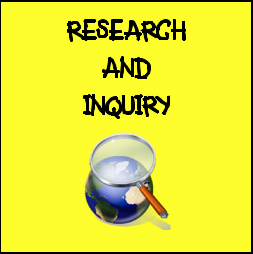Research as Inquiry
This Frame deals with using research to fill gaps in
knowledge. To extend knowledge questions have to be asked and from those more
complex questions arises. This process usually involve debates from various
perspectives but it all helps to extend knowledge in that specific field. Students
need to realise that the process is not straight forward and can become very
frustrating. Data collection requires students to communicate and liaise with
the community role players and the recognition of how issues affect the
community. Research methodologies need
be employed that will suit the issues being researched.
Knowledge Practices
Students will learn how to formulate and refine research
questions based on gaps in information, learn how to determine appropriate
scope of investigation, breaking down complex questions and use various
research methodologies. They will learn to monitor, organise and synthesize
information gathered and then draw reasonable conclusions based on analysis.
Disposition
Students will recognise their own limitations and ask for
help when needed. They will seek alternate views and compare it with mainstream
views while following ethical and legal guidelines in using the information
gathered.
This Frame seem very simple but the process is very
important in doing research effectively and accurately. It teaches us that we
are all just a link in the world of information gathering. Any information out
there both supporting and contradicting our views influence our own knowledge.
Teaching Scenario
Research Question
Investigating racism between first year students at UWC.
Learning Outcomes
·
Students should be able to formulate proper
research questions
·
Students should be able to understand how
research issues affect the greater community
·
Aquiring the ablility to handle data gathering
on a sensitive topic from a diverse group of people.
Activities
·
Indicate an additional question arising from the data gathered that you could further investigate as an independent topic.(Disposition :consider research as an open-ended exploration and engagement with information). (Knowledge Practice: formulate questions for research based on information gaps or reexamination of existing, possibly conflicting, information;
·
Design two questionnaires/surveys.: One for
students and one for academic staff. Analyse and compare data gathered from the
two groups. (Disposition: Seek multiple perspectives during information
gathering)
·
Read the two articles provided on racism at
other universities. Based on your research analysis what additional steps could
the universities have taken to address and eradicate the problem. ( Knowledge Practice:
Use research appropriately to make decisions and take action)

 http://www.washingtonparent.com/articles/1302/image/coed-vs-single-sex-schools-300x300.png
http://www.washingtonparent.com/articles/1302/image/coed-vs-single-sex-schools-300x300.png